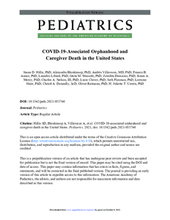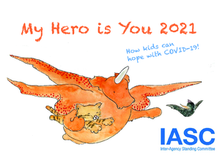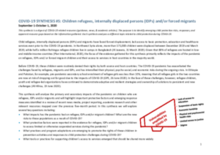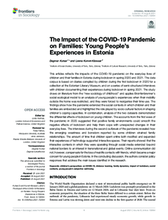This section includes resources on the response to the COVID-19 pandemic as it relates to child protection and children's care.
News on COVID-19 and Children's Care
Webinars and Events on COVID-19 Response
Displaying 71 - 80 of 756
This panel discussed coronavirus-associated caregiver loss and the work being done by the international community, the U.S. government, and faith-based actors to support vulnerable children and turn the tide toward better care. It was moderated by Gillian Huebner, executive director of the Georgetown University Collaborative on Global Children’s Issues.
This webinar, the sixth in the Transforming Children's Care Webinar Series, provided an introduction to trauma-informed care from various perspectives and vantage points.
This report captures overall and U.S. state-specific findings, disaggregated by race/ethnicity, for COVID-19-associated orphanhood and death of grandparent caregivers. High rates of orphanhood, marked disparities, and state-specific differences show the overlooked burden among children at greatest risk, in states most affected.
The COVID-19 pandemic is destined to leave millions more children without family caregivers. Increases in mortality of parents and other caregivers in the COVID-19 pandemic are accompanied by increases in extreme vulnerability from loss of livelihoods, schooling, health recovery and usual sources of service provision and support. This webinar aims to bring an understanding of how COVID-19 will affect the lives of children, how lessons learned from prior emergencies can be adapted, and how an understanding of complex adversities can maximize the effectiveness of our response.
The book aims to help children stay hopeful and positive during the COVID-19 pandemic. The story is a sequel to ‘My Hero is You: how kids can fight COVID-19!’, published in April 2020.
Both books have been released by a collaboration of 60 organizations working in the humanitarian sector, including the World Health Organization, UNICEF, the United Nations High Commissioner for Refugees, the International Federation of Red Cross and Red Crescent Societies and the MHPSS Collaborative for Children & Families in Adversity.
The strengths-based assessment tool serves to both prevent family breakdowns and reintegrate children from institutions back into families (or other family-based or alternative care options). This article provides an overview of the tool, including its purpose, set-up and functionality within a case management system.
The purpose of this evidence synthesis is to analyze the primary and secondary impacts of the pandemic on children who are refugees, IDPs and/or migrants and highlights important protective factors and emerging response measures identified in a review of recent news media, project reporting, academic research and other relevant resources mapped over the previous five-month period.
This articles reflects the impacts of the COVID-19 pandemic on the everyday lives of children and their families in Estonia during lockdown in spring 2020 and 2021. The data corpus is based on diaries compiled by children during the first lockdown in 2020 for a collection at the Estonian Literary Museum, and on a series of semi-structured interviews with children documenting their experiences during lockdown in spring 2021. The study draws on literature from the “new sociology of childhood” and applies Bronfenbrenner’s social ecological model to an analysis of young people’s experiences when their mobility outside the home was restricted, and they were forced to reorganise their time use.
This webinar, the fifth in the Transforming Children's Care Webinar Series focused on a new study ('Impact of COVID-19 on Privately Run Residential Care Institutions: Insights and Implications for Advocacy and Awareness Raising'). The study, comprising 21 semi-structured interviews across seven focus countries, explores the effect of COVID-19 on a small number of privately run and funded residential care institutions.
In this How We Care series, Family for Every Child has presented the programming of 3 of its CSO members who have been working on the ground on preventing domestic violence affecting children during COVID-19.




